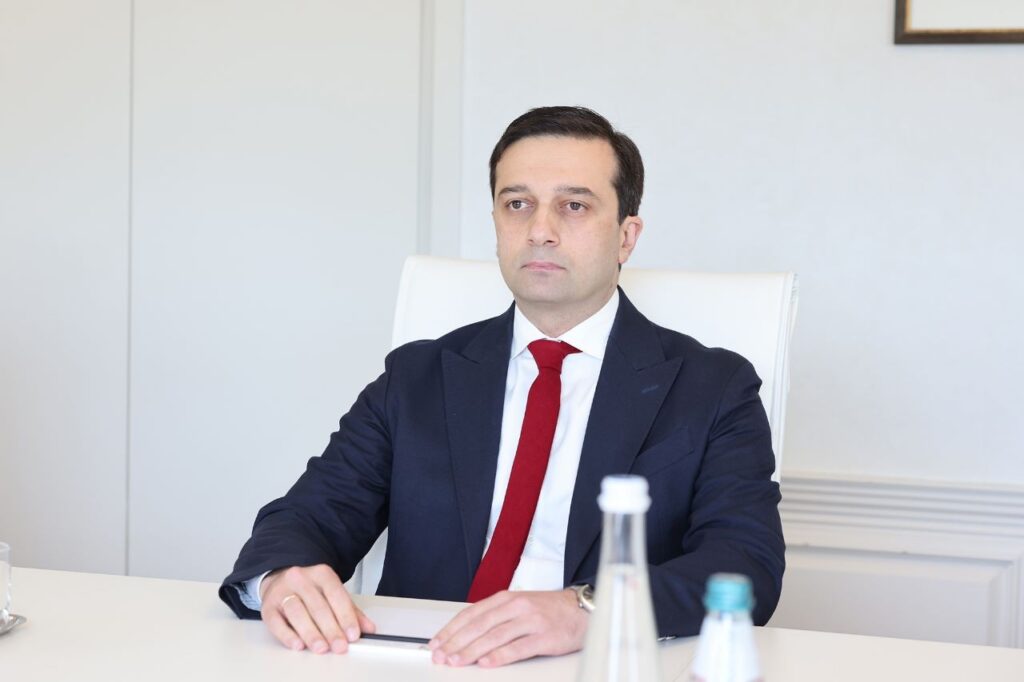Around 40 staff members from Georgia’s Public Defender’s Office have signed a letter openly criticising their superior for attending the launch of the new parliament, which was viewed by many as being unconstitutional.
On Tuesday, Mariam Moseshvili published the joint letter on Facebook on behalf of herself and 38 colleagues, criticising their boss, Public Defender Levani Ioseliani, for supporting the launch of the new parliament.
The office of Public Defender is designed to be an independent institution to monitor and advise on breaches of human rights in the country.
The ruling Georgian Dream party inaugurated the new parliament on Monday despite the election results being disputed at the Constitutional Court by President Salome Zourabichvili and by 30 outgoing MPs who cite widespread irregularities and violations in the 26 October vote.
Held amidst street protests and without the presence of opposition members or foreign diplomats, the launch of parliament was attended by other government officials, representatives of the Georgian Church, and Ioseliani.
Hours before being hit by the public protest letter from his staff, Ioseliani defended his decision to attend the inaugural session when questioned about it.
‘I do not understand the substance of your question regarding the legitimacy [of the parliament]. The convening of the Parliament of Georgia was entirely legitimate, in accordance with Article 38 of the Constitution’, Ioseliani insisted.
While Article 38 of the Constitution stipulates that the new parliament must convene within 10 days of the announcement of the final election results, various independent lawyers and key rights groups have pointed to Article 86 (5a) of the parliamentary procedures, which states that legal disputes against the results of the elections at the Constitutional Court prohibit elected candidates from being given their mandates as MPs.
The inauguration of parliament was only attended by Georgian Dream and their satellite group, People’s Power.
[Read more: Georgian Dream opens new parliament in apparent breach of constitution]
In the joint letter signed by 39 employees of the Public Defender’s Office, the signatories reiterated these legal arguments, expressing their regret that Ioseliani was involved in an event that ‘violates the constitutional and legal order, undermines the Public Defender’s role as an independent constitutional body, and erodes trust in the institution’.
They emphasised that they had ‘repeatedly attempted’ to address the issue ‘internally’, adding that, given public interest in the matter, they eventually deemed it essential to inform the public about their disagreement with Ioseliani.
Georgia’s Public Defender employs a team of around 120 staff members across the country.
Accusations of bias and inaction
Ioseliani assumed the post of public defender at the height of mass protests against Georgian Dream’s first attempt at adopting the foreign agent law in March 2023.
Before his parliamentary opposition group, Citizens, nominated him for the post, Georgian Dream rejected several other candidates supported by civil society groups.
Since then, Ioseliani has frequently faced criticism from opposition groups, civil activists, his predecessor Nino Lomjaria, and various government critics for being silent, late to respond, or overly lenient in addressing human rights violations by the authorities — an accusation Ioseliani’s office has repeatedly disputed.
Among other things, Ioseliani was rebuked by critics for failing to condemn the criminal trial of foreign agent law protester Lazare Grigoriadis in early 2023, a stance that contrasted with the denunciation by rights groups, who regarded the case as a politicised prosecution.
Ioseliani’s controversial stances included a statement made within days after the 26 October elections, in which he said that he ‘did not believe’ claims of mass vote manipulation.
Hours after Ioseliani’s appearance in parliament on 25 November, Ana Tavkhelidze resigned from the Public Defender’s Advisory Council for the Promotion, Protection, and Monitoring of the Implementation of the Convention on the Rights of Persons with Disabilities in protest. Explaining her decision, Tavkhelidze cited not only Ioseliani’s attendance of the disputed parliamentary inauguration but also his expressed doubts about election irregularities earlier.
Tavkhelidze became the second council member to resign, following Gia Kakachia, who had stepped down a week earlier in protest over Ioseliani’s comment.
On other occasions, Ioseliani argued that evaluating the constitutionality of the election results fell outside his purview.
‘Not knowing this is probably incompetence […] The right to participate in elections and its implementation also fall under the Public Defender’s mandate', his former deputy, Giorgi Burjanadze, reacted on 2 November.
In November last year, Ioseliani faced criticism from ten local rights groups, including the Human Rights Center and the Georgian Young Lawyers’ Association, for delivering a conclusion considered ‘biased in favour’ of the interior ministry in a dispute where a ministry employee, Goga Razmadze, alleged censorship, discrimination, and coercion by his employer. The groups criticised Ioseliani’s decision to dismiss Razmadze’s claims as unsubstantiated, describing it as setting ‘a harmful precedent’ for addressing labour discrimination disputes in Georgia.




 27 November 2024
27 November 2024



